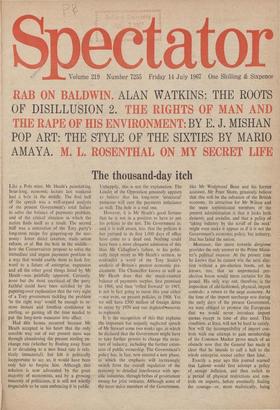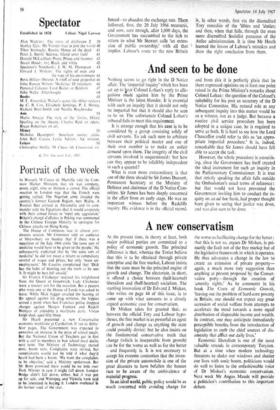The thousand-day itch
Like a Polo mint, Mr Heath's painstaking, hour-long, economic lecture last weekend had d hole in the middle. The first half of the speech was a well-argued analysis of the present Government's total failure to solve the balance of payments problem, and of the critical situation in which the nation finds itself as a result. The second half was a reiteration of the Tory party's long-term recipe for gingering-up the eco- nomy: lower direct taxation, trade union reform, et al. But the hole in the middle— how the Conservatives propose to solve the immediate and urgent payments problem in a way that would enable them to look for- ward to a future of enterprise, expansion and all the other good things listed by Mr Heath—was painfully apparent. Certainly, none but the most uncritical of the party faithful could have been satisfied by the papering-over explanation that the very sight of a Tory government tackling the problem `in the right way' would be enough to re- store instant and limitless confidence in sterling, so gaining all the time needed to put the long-term measures into effect.
Had this lacuna occurred because Mr Heath accepted in his heart that the only sensible way out of our present mess was through abandoning the present sterling ex- change rate (whether by floating away from it or devaluing to a new fixed rate is rela- tively immaterial), but felt it politically inopportune to say so, it would have been only fair to forgive him. Although this solution is now advocated by the great majority of economists, and by a growing minority of politicians, it is still not wholly respectable to be seen embracing it in public. Unhappily, this is not the explanation. The Leader of the Opposition genuinely appears to believe that his long-term 'structural' panaceas will cure the payments imbalance as well. The hole is a real one.
However, it is Mr Heath's good fortune that he is not in a position to have to put his policies to the test. The Government is; and it is well aware, too, that the policies it has pursued in its first 1,000 days of office have come to a dead end. Nothing could have been a more eloquent admission of this than Mr Callaghan's failure, in his politi- cally inept retort to Mr Heath's sermon, to contradict a word of the Tory leader's analysis of Britain's present economic pre- dicament. The Chancellor knows as well as Mr Heath does that the, much-vaunted balance of payments surplus, first promised in 1966, and then `rolled forward' to 1967, is not in fact going to occur this year either —nor even, on present policies, in 1968. Yet we still have £500 million of foreign debts to repay by 1970 and our depletedereserves to replenish, It is the recognition of this that explains the important but unjustly neglected speech of Mr Stewart some two weeks ago, in which he declared that the Government might have to take further powers to change the struc- ture of industry, including the further exten- sion of public ownership. The Government's policy has, in fact, now entered a new phase, in which the emphasis will increasingly switch from the overall regulation of the economy to detailed interference with spe- cific industries, through bribes of government money for joint ventures. Although some of the more naive members of the Government, like Mr Wedgwood Benn and his former assistant, Mr Peter Shore, genuinely believe that this will be the salvation of the British economy, its attraction for Mr Wilson and the more sophisticated members of the present administration is that it looks both dynamic and socialist, and that a policy of `taking industry by the scruff of the neck' might even make it appear as if it is not the Government's economic policy, but industry, that has failed the nation.
Moreover, this move towards dirigisme provides the only answer to the Prime Minis- ter's political impasse. At the present time he knows that he cannot win the next elec- tion without a pre-election boom, yet he knows, too, that an unprotected pre- election boom would mean curtains for the pound. His Only way out, therefore, is the imposition of old-fashioned, physical, import controls: a return to the siege economy. At the time of the import surcharge row during the early days of the present Government, we were obliged to promise the Europeans that we would never introduce import quotas except in time of dire need. This condition, at least, will not'be hard to satisfy. Nor will the incompatibility of import con- trols with our attempt to gain membership of the Common Market prove much of an obstacle now that the General has made it clear that lie intends to call a halt to the whole enterprise sooner .rather than later.
Exactly a year ago this journal warned that Labour would first attempt a policy of savage deflation, and then switch to a period of physical restrictions and con- trols on imports, before eventually finding the courage—or, more realistically, being forced—to abandon the exchange rate. There followed, first, the 20 July 1966 measures. and now, sure enough, after 1,000 days, the Government has succumbed to the itch to return to what Mr Stewart calls 'an exten- sion of public ownership,' with all that implies. Labour's route to the new Britain is, in other words, first via the discredited Tory remedies of the 'fifties and 'sixties; and then, when that fails, through the even more discredited Socialist panaceas of the Attlee administration. It is time Mr Heath learned the lesson of Labour's mistakes and drew the right conclusion from them.































